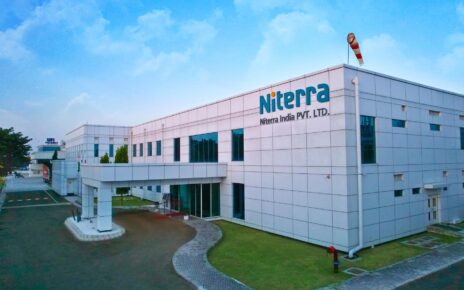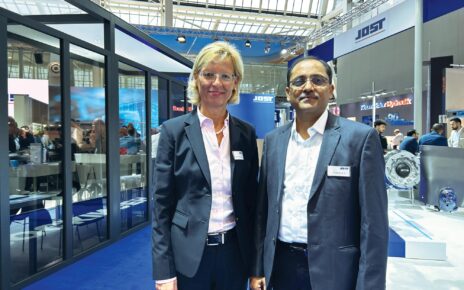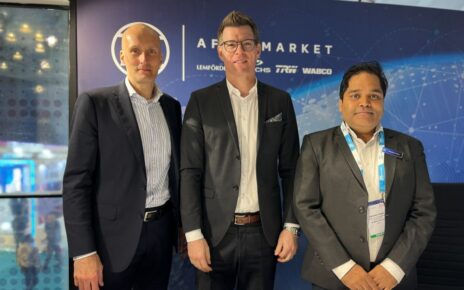At the 64th Annual Convention of Society of Indian Automobile Manufacturers (SIAM), the industry focused on “Sustainable Mobility Journey towards Viksit Bharat” wherein prominent leaders and policymakers discussed the pivotal role of sustainable mobility in achieving Viksit Bharat goals by 2047.
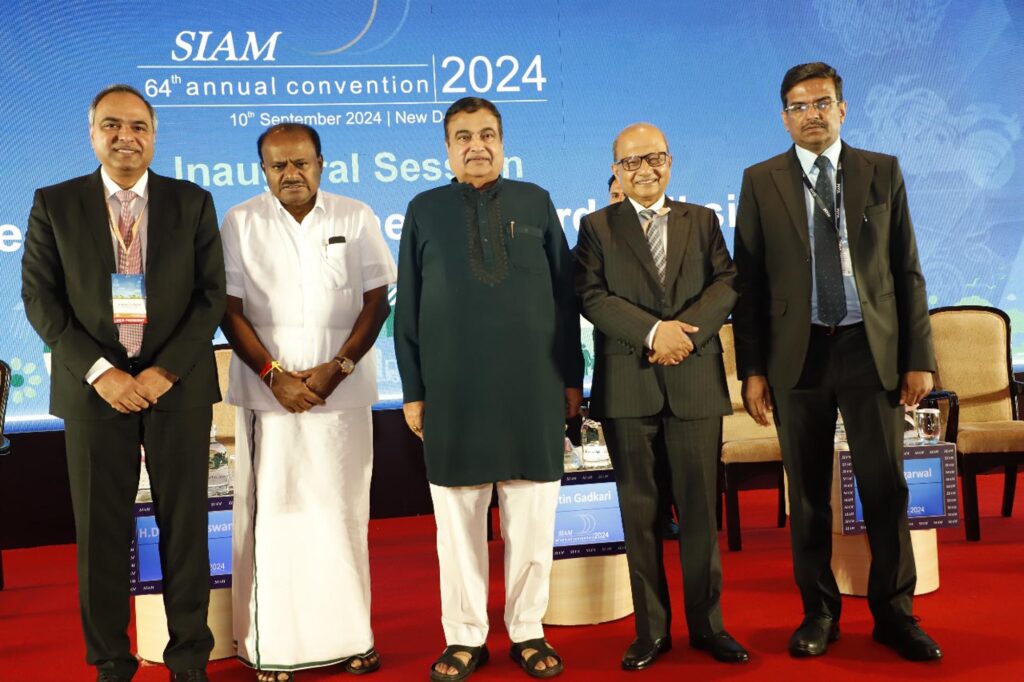
In his special message, Prime Minister Mr. Narendra Modi, emphasized on the need for the Automobile sector to set an example for others to follow and said, “The road ahead demands that our progress is rapid while also being sustainable. Working on greener and cleaner mobility is a vital step in this direction”.
Chief Guest, Mr. Nitin Gadkari, Union Minister of Road Transport & Highways, highlighted the Government’s initiatives and vision for sustainable transportation, stating, “The automobile industry plays a pivotal role in realizing the Prime Minister’s vision of transforming India into a 5 trillion-dollar economy and elevating it to the third largest economy globally. Our ambition is to extend it as the number one auto manufacturing industry worldwide. As we target a carbon-neutral status by 2070, innovation and sustainable practices in the auto sector are crucial.”
Guest of Honour, Mr. H. D. Kumaraswamy, Hon’ble Union Minister of Heavy Industries and Steel, Government of India, spoke on the critical importance of industrial growth aligned with sustainability goals. He remarked, “Enhanced by our Prime Minister’s sustainability pledges in Glasgow and robust Make in India initiatives, we are aggressively promoting electric mobility. Government policies are geared to fuel this transition, fostering a conducive environment for industry growth and sustainable development.”
Mr. Vinod Aggarwal, President of SIAM and Managing Director & CEO of Volvo Eicher Commercial Vehicles Ltd., highlighted the automobile industry’s role in driving sustainable mobility. He stated, “The automobile industry is keeping pace and setting the standards for sustainable growth. Contributing 6.8% to the GDP and witnessing an impressive 12.5% growth last year alone, the industry’s turnover has soared to ₹20 lakh crore. As we look towards ‘Viksit Bharat 2047’, SIAM’s commitment to decarbonisation and safety is steadfast. With initiatives like the FAME program fuelling a 90% growth in EVs Passenger Vehicles, along with Ethanol and Gaseous fuels we are steering towards cleaner, greener mobility.”
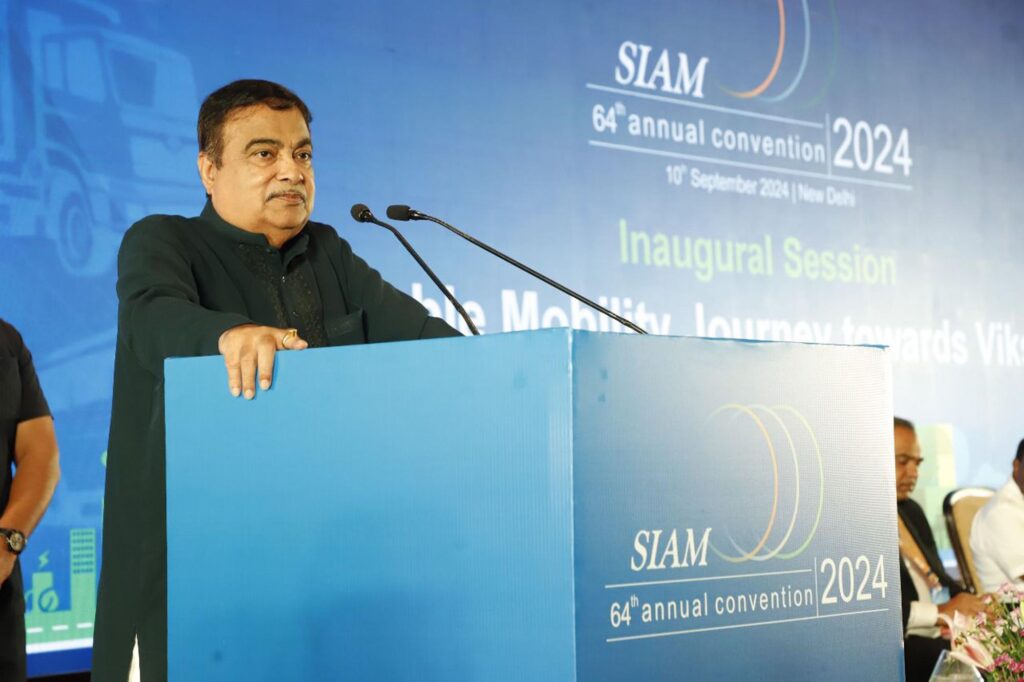
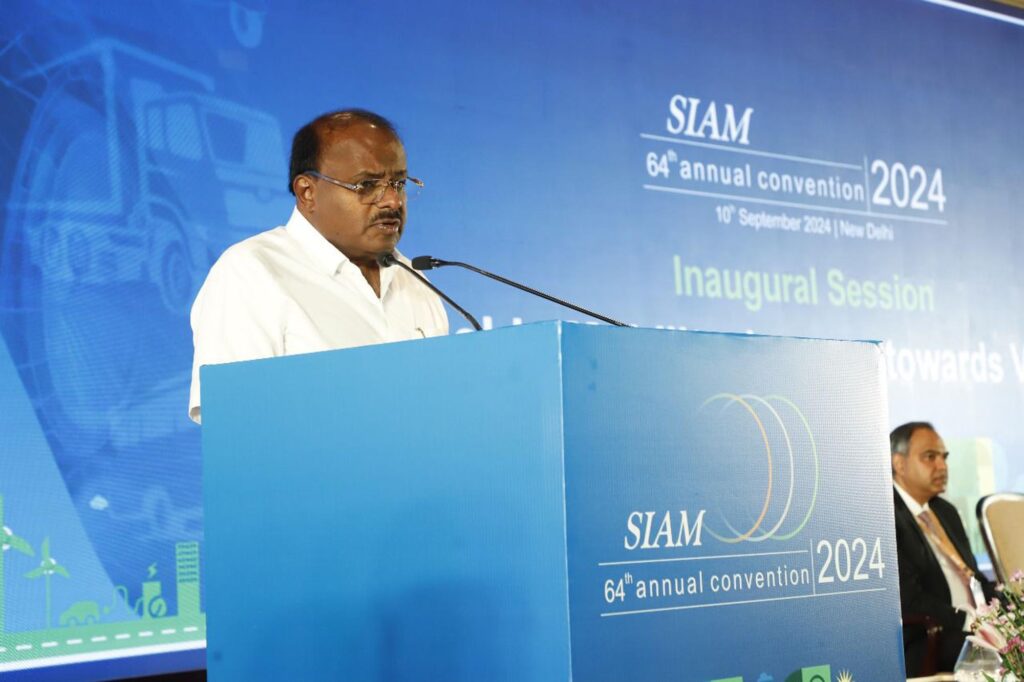
Mr. Shailesh Chandra, Vice President of SIAM and Managing Director of Tata Motors Passenger Vehicles Ltd. and Tata Passenger Electric Mobility Ltd., emphasized the need for a collective effort to accelerate the transition to sustainable mobility. He said, “The government’s strong commitment to sustainable mobility and the constant support from the ministries have facilitated the industry’s transitioning to sustainable mobility. We are fully aligned with the government’s vision of ensuring sustainable, safe, and affordable transport solutions, and achieving net carbon-zero in future.”
Mr. Rajesh Menon, Director General, Society of Indian Automobile Manufacturers (SIAM), was also present during the session. He highlighted SIAM’s various initiatives and commitment towards sustainable mobility.
Global Leadership in Sustainable Mobility
The Annual Convention discussed strategies to achieve “Global Leadership in Sustainable Mobility.” Guest of Honour, Mr. Anurag Jain, Secretary, Ministry of Road Transport & Highways, Government of India, highlighted the importance of collaboration between the Government and the automotive industry to drive sustainable growth, mentioning, “As we aim to transform India into a developed country by 2047, substantial effort is required across various sectors. Our roadmap for the development of National Highways and the expansion of the metro network from 21 cities to 60 by 2047 reflect our commitment to enhancing infrastructure. Our vision for Amrit Kaal is anchored by four principal pillars: efficient and equitable logistics, safety in movement, sustainability in transport, and enhanced user convenience”.
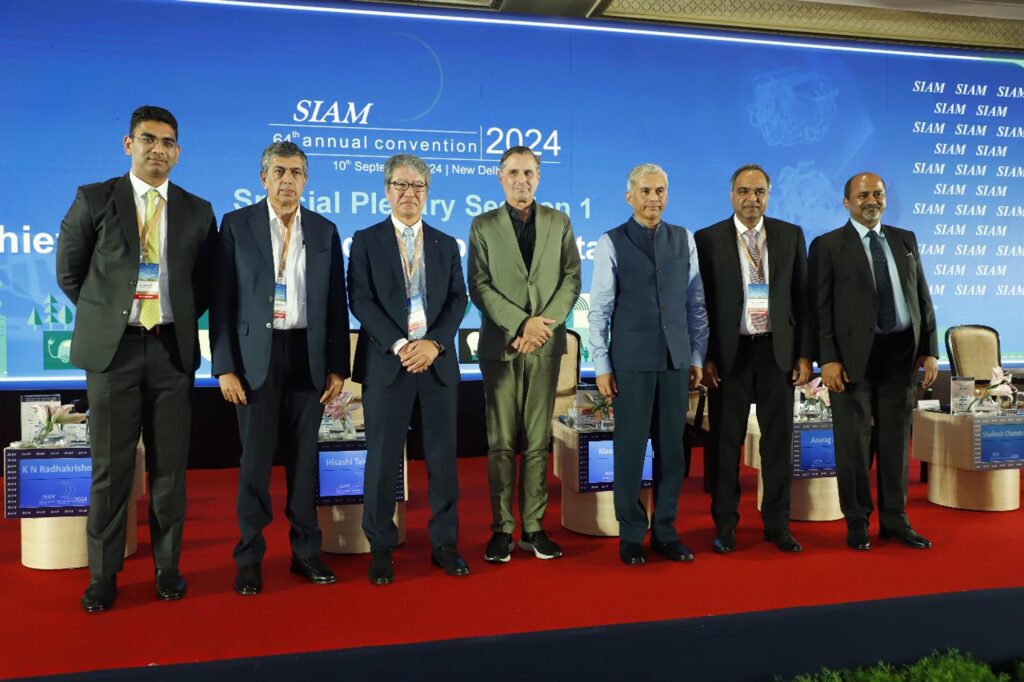
Mr. Shailesh Chandra, Vice President of SIAM and Managing Director of Tata Motors Passenger Vehicles Ltd. and Tata Passenger Electric Mobility Ltd., said, “Attaining global leadership in sustainable mobility demands our focus on critical future areas such as hydrogen utilisation, adoption of circular economy, and shared mobility solutions. We will explore strategies for aggressive localization in India’s manufacturing sector. Additionally, we will look at methodologies to position India among the top five low-cost manufacturers globally, leveraging our unique capabilities and innovations.”
Mr. Klaus Zellmer, Chairman of the Management Board & CEO of Škoda Auto a.s., said, “Skoda has been a significant player in Europe for 129 years, and is the best-selling EU brand in India. We aim for CO2-neutral production by 2030, utilizing green energy and managing resources sustainably. We are not just part of India’s automotive story—we are committed to driving it forward, responsibly and sustainably.”
Mr. Hisashi Takeuchi, Managing Director & CEO of Maruti Suzuki India Ltd., said, “India’s automotive future is bright, with innovative clean energy technologies and bio-fuels, reducing dependency on imports and enhancing our exports. Inspired by Prime Minister Modi’s vision for decarbonisation, Industry’s mindful consumption and circular economy can propel India to become a world leader in sustainable practices.”
Mr. K N Radhakrishnan, Director & CEO of TVS Motor Company Ltd., said, “Industry and Government’s net-zero target and sustainability should ensure that policies are customer centric. Role played by auto component manufacturers in India is phenomenal as we continue to deliver world class products in India and across the globe.”
During the session, Mr. Nitesh Gupta, Partner and Leader of Auto Practice in India at McKinsey & Company, gave an insightful presentation and underscored the urgent need for sustainable solutions to reduce emissions generated by the transport sector.


